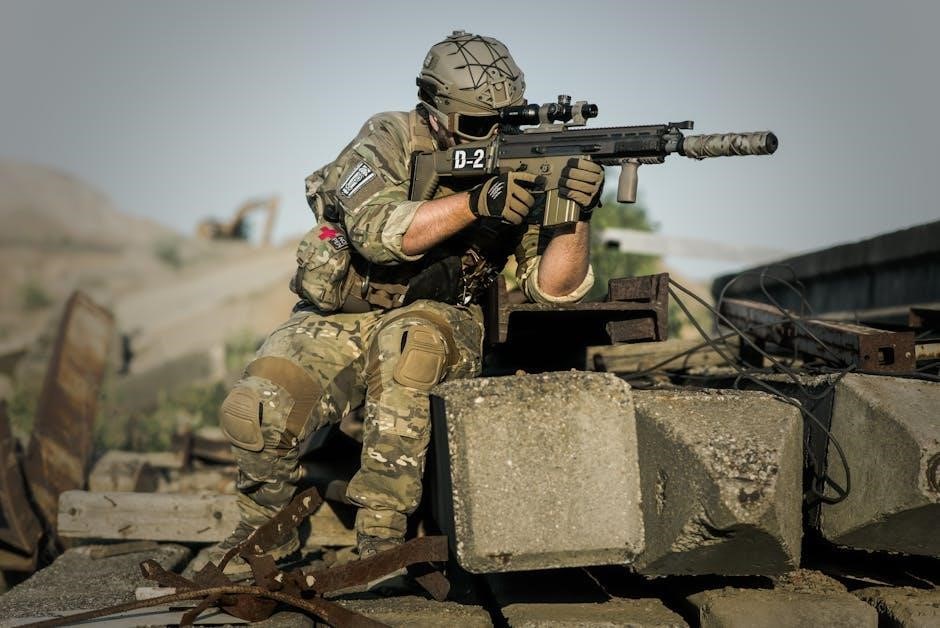History of the NCO Creed
The NCO Creed was developed in 1973 by senior noncommissioned officers at Fort Benning‚ Georgia. It establishes leadership standards and guides NCOs in their duties.
Development in the 1970s
The NCO Creed was developed in 1973 by a group of senior noncommissioned officers at Fort Benning‚ Georgia. This initiative aimed to create a unified standard of conduct and leadership for NCOs‚ mirroring the officer’s oath. The Creed was crafted to inspire professionalism and responsibility‚ addressing the need for a clear guide for NCOs. It emphasized leadership‚ duty‚ and selfless service‚ becoming a cornerstone of NCO training. The development process involved collaboration among seasoned NCOs who sought to formalize their role and expectations. The Creed’s creation marked a significant shift in NCO professional development‚ solidifying its importance in Army culture. Its adoption has since influenced NCO leadership across generations.
Key Contributors
The NCO Creed was primarily developed by a group of seasoned noncommissioned officers at Fort Benning‚ Georgia‚ in 1973. These individuals‚ representing various branches and levels of experience‚ collaborated to create a unified standard of professionalism and leadership. Their contributions were instrumental in shaping the Creed’s core values‚ which remain foundational to NCO leadership. While specific names of contributors are not widely documented‚ their collective effort was pivotal in establishing a shared identity for NCOs. The Creed reflects their dedication to fostering a culture of responsibility‚ integrity‚ and selfless service. Their work laid the groundwork for modern NCO training and continues to inspire leaders across the Army.
The NCO Creed emphasizes leadership‚ duty‚ respect‚ selfless service‚ honor‚ integrity‚ and personal courage. These values guide NCOs in leading soldiers with professionalism and ethics. The NCO Creed defines leadership as setting the example and inspiring soldiers to achieve excellence. NCOs are expected to lead by example‚ demonstrating competence‚ confidence‚ and character. Leadership involves making sound decisions‚ fostering teamwork‚ and ensuring mission accomplishment. The Creed emphasizes that NCOs must be role models‚ earning the trust and respect of their soldiers. It underscores the responsibility of NCOs to mentor and develop subordinates‚ preparing them for future challenges. Effective leadership is critical to unit cohesion and success‚ ensuring that soldiers are well-trained‚ motivated‚ and ready to execute their duties. The Creed reinforces the NCO’s role as the backbone of the Army‚ entrusted with leading America’s soldiers.
The NCO Creed emphasizes duty as a fundamental responsibility of noncommissioned officers. It highlights the commitment to fulfill obligations to the Army‚ subordinates‚ and the nation. Duty encompasses adhering to orders‚ upholding standards‚ and ensuring mission success. NCOs are expected to perform their tasks with dedication and accountability‚ setting a high standard for themselves and their soldiers. The Creed reinforces the idea that duty is not just a responsibility but a way of life for NCOs‚ who must remain loyal and steadfast in their commitment to service. By embracing duty‚ NCOs contribute to the professionalism and readiness of the Army‚ ensuring the accomplishment of its mission. Respect is a cornerstone of the NCO Creed‚ reflecting the values of dignity and regard for fellow soldiers and civilians. NCOs are expected to treat others with respect‚ fostering an environment of unity and trust. This principle extends to recognizing the worth of every individual‚ regardless of rank or position. By demonstrating respect‚ NCOs set an example that promotes mutual respect within the ranks. The Creed emphasizes that respect is not only about how NCOs treat others but also how they conduct themselves‚ ensuring a professional and respectful attitude in all interactions. This fosters a cohesive and effective military community‚ where respect is both given and earned. Selfless service is a key tenet of the NCO Creed‚ emphasizing the importance of prioritizing the needs of the mission and others over personal interests. NCOs are expected to embody this principle by putting the welfare of their soldiers and the success of their team above their own. The Creed highlights that selfless service is not just a duty but a commitment to the greater good. Through their actions‚ NCOs demonstrate that they are willing to make sacrifices for the benefit of their unit and the Army. This selflessness fosters a culture of teamwork and shared responsibility‚ ensuring that the mission is always the primary focus. By living this value‚ NCOs inspire their soldiers to follow their example. Honor is a cornerstone of the NCO Creed‚ reflecting the commitment to uphold the highest standards of integrity and ethical behavior. It emphasizes the importance of being truthful‚ trustworthy‚ and morally upright in all actions. NCOs are expected to act with honor in their personal and professional lives‚ setting an example for their soldiers. The Creed underscores that honor is not just a value but a way of life for noncommissioned officers. By living with honor‚ NCOs strengthen the trust and confidence of their peers‚ subordinates‚ and superiors. This commitment to honor ensures that they remain the backbone of the Army‚ always striving to do what is right and just. Integrity is a fundamental pillar of the NCO Creed‚ representing the moral and ethical foundation of a noncommissioned officer’s character. It demands unwavering adherence to ethical principles and the courage to stand by what is right‚ even in the face of adversity. NCOs are expected to consistently demonstrate integrity in their decisions and actions‚ fostering trust and credibility within their units. By upholding integrity‚ they set a powerful example for their soldiers‚ reinforcing the Army’s values and mission. This commitment ensures that NCOs remain the embodiment of professionalism and moral leadership‚ guiding their teams with honesty and accountability at all times. Personal courage is a cornerstone of the NCO Creed‚ emphasizing the resolve to take risks and face challenges head-on. It encompasses both physical and moral bravery‚ requiring NCOs to act resolutely in the face of danger or adversity. This trait ensures that leaders stand firm in their convictions‚ protecting their teams and upholding the Army’s values. By demonstrating personal courage‚ NCOs inspire confidence and resilience among their soldiers‚ fostering a culture of strength and determination. Their unwavering commitment to courage serves as a beacon of leadership‚ guiding their units through challenging situations with steadfast resolve and integrity. The NCO Creed plays a pivotal role in the training and development of noncommissioned officers‚ serving as a foundational document that outlines their responsibilities and ethical standards. It is widely used in NCO education programs‚ including Basic Leader and Advanced Leader courses‚ to instill leadership principles and foster a sense of professionalism. The Creed is often recited during training sessions to reinforce its message and inspire commitment to the Army’s values. By integrating the Creed into their curriculum‚ NCO training programs ensure that leaders are equipped with the moral and professional guidance necessary to lead effectively. Its availability as a PDF resource makes it easily accessible for study and reference‚ further enhancing its impact on NCO development. The NCO Creed has profoundly shaped the leadership ethos of noncommissioned officers‚ emphasizing their role as mentors‚ trainers‚ and ethical guides. By defining the responsibilities and moral standards of NCOs‚ the Creed fosters professionalism‚ accountability‚ and decision-making. It instills a sense of duty and honor‚ inspiring leaders to prioritize their soldiers’ well-being and development. The Creed’s principles have strengthened the NCO Corps‚ ensuring leaders are committed to upholding Army values and maintaining high standards of integrity. Its influence extends beyond individual leadership‚ contributing to a cohesive and resilient force capable of overcoming challenges. The Creed’s impact is evident in the trust and respect NCOs earn‚ both within their units and across the Army. The NCO Creed is widely available in PDF format for easy access and reference. Official Army websites‚ such as the U.S. Army Center for Army Leadership‚ offer free downloads of the Creed. Additionally‚ platforms like Academia.edu and other military resource sites provide downloadable versions. The PDF format ensures that the Creed is portable and can be accessed offline‚ making it convenient for NCOs to study and reflect on its principles. Its availability in multiple formats‚ including PDF and TXT‚ caters to different preferences and ensures widespread dissemination. This accessibility underscores the importance of the Creed as a foundational document for NCO leadership development. The NCO Creed holds profound significance in the Army as it encapsulates the core values and responsibilities of non-commissioned officers. It serves as a guiding document that defines leadership‚ duty‚ and commitment‚ fostering a culture of professionalism and accountability. The Creed is deeply ingrained in Army traditions and is often recited during training and ceremonies to reinforce its principles. It emphasizes the importance of selfless service‚ honor‚ and integrity‚ which are essential for maintaining discipline and cohesion within the ranks. By adhering to the Creed‚ NCOs inspire trust and confidence among their subordinates‚ ensuring the Army’s effectiveness in achieving its mission. Its influence extends beyond active duty‚ shaping the mindset of future leaders in JROTC programs and beyond. The NCO Creed is complemented by The NCO Guide (FM 7-22.7) and The Warrior Ethos‚ which further outline leadership principles and professional development for non-commissioned officers. These resources are available as PDFs for easy access and reference. The NCO Guide (FM 7-22.7) is a critical publication for non-commissioned officers‚ providing detailed guidance on leadership‚ professional development‚ and operational responsibilities. It serves as a primary resource for NCOs to understand their roles and expectations within the Army. The guide emphasizes the importance of mentorship‚ training‚ and maintaining high standards of performance. It also outlines the core competencies required for effective leadership at various levels. Available as a downloadable PDF‚ FM 7-22.7 ensures accessibility for all NCOs‚ whether active duty or reserve. This document is essential for professional growth and aligns with the principles outlined in the NCO Creed‚ reinforcing the Army’s commitment to developing capable and ethical leaders. The Warrior Ethos embodies the moral and ethical principles that guide soldiers in their actions and decisions. It emphasizes loyalty‚ duty‚ respect‚ selfless service‚ honor‚ integrity‚ and personal courage. Rooted in the Soldier’s Creed‚ the Warrior Ethos ensures that soldiers adhere to a shared set of values‚ fostering a culture of trust and accountability. It serves as a foundation for leadership and conduct‚ both on and off the battlefield. The Warrior Ethos is deeply intertwined with the NCO Creed‚ as both documents aim to inspire and guide soldiers to uphold the highest standards of professionalism and character. Together‚ they form the cornerstone of the Army’s leadership philosophy‚ ensuring that soldiers remain committed to their mission and fellow warriors. The NCO Creed holds profound cultural significance within the Army‚ serving as a unifying force that reflects the values and traditions of non-commissioned officers. It embodies the identity and responsibility of NCOs‚ inspiring pride and commitment to the profession of arms. The Creed is often recited during ceremonies‚ training events‚ and gatherings‚ fostering a shared sense of purpose and belonging. Its principles resonate beyond the military‚ influencing public perception of the Army’s leadership and ethos. By emphasizing loyalty‚ duty‚ and selfless service‚ the NCO Creed reinforces the Army’s cultural identity and continues to inspire future generations of leaders. It remains a cornerstone of military tradition‚ symbolizing excellence and service. The NCO Creed remains highly relevant in modern military contexts‚ guiding non-commissioned officers in their roles amid evolving challenges. As the Army adapts to new technologies and operational demands‚ the Creed’s principles of leadership‚ duty‚ and integrity provide a timeless foundation for NCOs. Its emphasis on adaptability and selfless service aligns with contemporary leadership requirements. The Creed also supports the Army’s shift toward virtual learning platforms‚ ensuring NCOs maintain professional standards in both traditional and digital environments. By upholding these values‚ NCOs continue to inspire and lead effectively in a changing world‚ reinforcing the Creed’s enduring significance in modern military service. The NCO Creed is a foundational document that has shaped the identity and professionalism of non-commissioned officers in the U.S. Army since its inception in the 1970s. Its core values of leadership‚ duty‚ respect‚ selfless service‚ honor‚ integrity‚ and personal courage continue to inspire NCOs to lead by example. The Creed’s availability as a PDF ensures accessibility for training and reference‚ reinforcing its significance in modern military education. As a cornerstone of NCO development‚ the Creed remains a vital tool for fostering leadership excellence and maintaining the high standards of the Army. Its enduring relevance underscores its importance in shaping the next generation of NCOs.
Core Values of the NCO Creed
Leadership
Duty
Respect
Selfless Service
Honor
Integrity
Personal Courage

Role in NCO Training

Impact on NCO Leadership

Availability of the NCO Creed PDF
Significance in the Army

Related NCO Publications
The NCO Guide (FM 7-22.7)
The Warrior Ethos
Cultural Significance

Modern Relevance